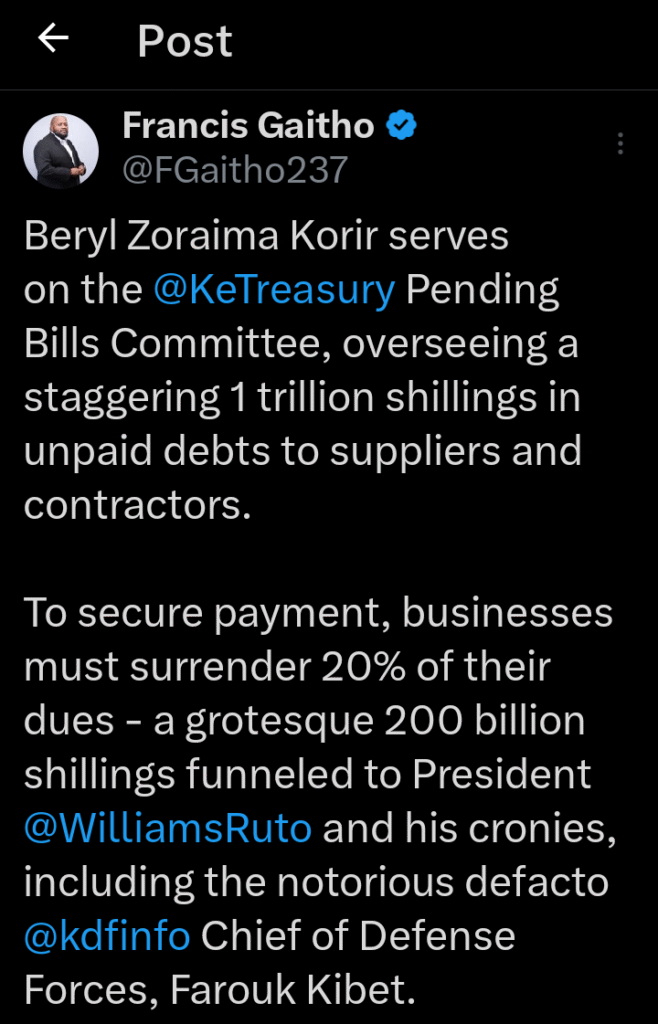There are growing allegations surrounding Beryl Zoraima Korir, a member of Kenya’s National Treasury Pending Bills Committee. She is accused of being involved in a corruption scandal that involves the mismanagement of government debts.
According to research, businesses are allegedly forced to pay bribes amounting to 20% of their dues to secure payments for their pending bills. This would total approximately 200 billion shillings. These funds are said to be funneled to high-ranking officials, including top govt official, with the bribes allegedly benefiting figures like Farouk Kibet, this is according to Francis Gaitho.

Francis Gaitho, a prominent figure critical of the political elite, has been vocal about the alleged corruption, sharing his concerns on social media. His post raises serious questions about the integrity of the system, particularly about the role of Nixon Korir, Beryl’s husband, who serves as the Principal Secretary for Lands. Nixon is accused of facilitating the payment of bribes, further complicating the situation by creating potential conflicts of interest.
This has fueled concerns among the public, especially regarding the connections between his wife’s position on the Pending Bills Committee and his own position in government. The controversy has sparked public outrage. Many people are deeply concerned about the economic and social consequences of such corruption.
The allegations suggest that businesses, particularly those struggling with unpaid debts, are at the mercy of corrupt systems. The extra financial burden imposed on them through bribes only worsens their financial stability, and subcontractors are left to suffer. This situation has intensified calls for accountability, with critics like Gaitho condemning the lavish lifestyles of the political elite, who appear to benefit from corrupt practices while the rest of the country faces economic hardship.
Social media has played a pivotal role in amplifying public matter, especially among Kenya’s younger generation, including Gen Z, who are particularly active in the protests. On platforms like X, there has been widespread support for the hashtag #RutoMustGo, reflecting the growing frustration with the government. Gaitho’s post has resonated strongly with many, furthering the narrative that systemic corruption is preventing the country from moving forward. Young people are demanding that their voices be heard and that those responsible for perpetuating this corruption be held accountable.
The scandal has bigger implications for Kenya’s economy, particularly for businesses that rely on timely payments. The bribery system creates a vicious cycle in which only those willing to participate in corruption can succeed, while honest contractors are left behind.

The delay in payments further exacerbates the problem, affecting subcontractors and creating a ripple effect that touches ordinary citizens. Many have pointed out that it is the common people who suffer the most when such systems are allowed to thrive unchecked.
Gaitho’s allegations are a sharp reminder of the need for transparency and accountability in government. His criticism is not without risk.
Nevertheless, the public support for his views, as seen in the responses to his post, indicates that many Kenyans are growing tired of the status quo. The responses reflect a deep-seated desire for change and a rejection of the corruption that has marred the country for years.
This scandal also underscores the growing role of social media in holding the powerful to account. Platforms like X are increasingly becoming the go-to spaces for people to express their anger, frustrations, and demands for justice.
Gaitho’s post has highlighted the disconnection between Kenya’s political elite and the struggles of ordinary citizens, driving home the point that the ruling class often appears to be detached from the realities of life for the majority.
At the same time, the issue reveals the deepening frustrations with the current government. It is not just about the individuals involved but also the system that allows such behavior to thrive. Kenyans are looking for solutions, and there is growing momentum behind calls for accountability.
As the youth continue to demand better governance, the calls for change will likely intensify, especially as more scandals like this come to light.
The allegations against Beryl Zoraima Korir and her husband Nixon Korir, alongside the involvement of top government official , highlight the persistence of corruption in Kenya’s government.
This issue has raised public outcry, especially among Kenya’s youth, who are using social media as a tool to demand accountability.





















Add Comment